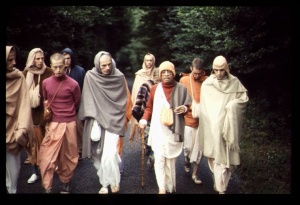CC Madhya 19.214 (1975): Difference between revisions
(Vanibot #0027: CCMirror - Mirror CC's 1996 edition to form a basis for 1975) |
(Vanibot #0020: VersionCompareLinker - added a link to the Version Compare feature) |
||
| Line 2: | Line 2: | ||
<div style="float:left">'''[[Sri Caitanya-caritamrta (1975)|Śrī Caitanya-caritāmṛta (1975)]] - [[CC Madhya (1975)|Madhya-līlā]] - [[CC Madhya 19 (1975)|Chapter 19: Lord Śrī Caitanya Mahāprabhu Instructs Śrīla Rūpa Gosvāmī]]'''</div> | <div style="float:left">'''[[Sri Caitanya-caritamrta (1975)|Śrī Caitanya-caritāmṛta (1975)]] - [[CC Madhya (1975)|Madhya-līlā]] - [[CC Madhya 19 (1975)|Chapter 19: Lord Śrī Caitanya Mahāprabhu Instructs Śrīla Rūpa Gosvāmī]]'''</div> | ||
<div style="float:right">[[File:Go-previous.png|link=CC Madhya 19.213 (1975)|Madhya-līlā 19.213]] '''[[CC Madhya 19.213 (1975)|Madhya-līlā 19.213]] - [[CC Madhya 19.215 (1975)|Madhya-līlā 19.215]]''' [[File:Go-next.png|link=CC Madhya 19.215 (1975)|Madhya-līlā 19.215]]</div> | <div style="float:right">[[File:Go-previous.png|link=CC Madhya 19.213 (1975)|Madhya-līlā 19.213]] '''[[CC Madhya 19.213 (1975)|Madhya-līlā 19.213]] - [[CC Madhya 19.215 (1975)|Madhya-līlā 19.215]]''' [[File:Go-next.png|link=CC Madhya 19.215 (1975)|Madhya-līlā 19.215]]</div> | ||
{{CompareVersions|CC|Madhya 19.214|CC 1975|CC 1996}} | |||
{{RandomImage}} | {{RandomImage}} | ||
==== TEXT 214 ==== | ==== TEXT 214 ==== | ||
<div class="verse"> | <div class="verse"> | ||
:kṛṣṇa vinā tṛṣṇā- | :kṛṣṇa vinā tṛṣṇā-tyāga--tāra kārya māni | ||
:ataeva | :ataeva 'śānta' kṛṣṇa-bhakta eka jāni | ||
</div> | </div> | ||
| Line 25: | Line 24: | ||
<div class="translation"> | <div class="translation"> | ||
"Giving up all desires not connected with Kṛṣṇa is the business of one who is in the śānta-rasa. Only a devotee of Kṛṣṇa can be situated on that platform. He is thus called a śānta-rasa-bhakta. | |||
</div> | </div> | ||
| Line 32: | Line 31: | ||
<div class="purport"> | <div class="purport"> | ||
In this position, one is freed from all material enjoyment. When one is not agitated or disturbed, he can immediately realize his relationship with Kṛṣṇa. A śānta-rasa devotee is therefore always fixed in realization. This instruction was given by the Lord Himself to Uddhava. The beginning of pure devotional service is called anyābhilāṣitā-śūnya. When one is situated on the platform of neutrality, he is freed from the material platform and fully situated in spiritual life. The word dama | In this position, one is freed from all material enjoyment. When one is not agitated or disturbed, he can immediately realize his relationship with Kṛṣṇa. A śānta-rasa devotee is therefore always fixed in realization. This instruction was given by the Lord Himself to Uddhava. The beginning of pure devotional service is called anyābhilāṣitā-śūnya. When one is situated on the platform of neutrality, he is freed from the material platform and fully situated in spiritual life. The word dama used in verse 213 means indriya-saṁyama-curbing one's senses. The word dama can also mean curbing one's enemies. A king has to take steps to curb the criminal activities of his citizens. Great rājarṣis, devotee kings, used to control undesirable elements in their states, and this also may be called dama. However, dama here refers to the conditioned soul who must control his senses. Real dama means controlling the undesirable activities of the senses. | ||
</div> | </div> | ||
Latest revision as of 11:57, 27 January 2020

A.C. Bhaktivedanta Swami Prabhupada
TEXT 214
- kṛṣṇa vinā tṛṣṇā-tyāga--tāra kārya māni
- ataeva 'śānta' kṛṣṇa-bhakta eka jāni
SYNONYMS
kṛṣṇa vinā—without Kṛṣṇa; tṛṣṇā-tyāga—giving up all desires; tāra—of śānta-rasa; kārya—the business; māni—I accept; ataeva—therefore; śānta—the position of equilibrium; kṛṣṇa-bhakta—a devotee of Kṛṣṇa; eka—only; jāni—I know.
TRANSLATION
"Giving up all desires not connected with Kṛṣṇa is the business of one who is in the śānta-rasa. Only a devotee of Kṛṣṇa can be situated on that platform. He is thus called a śānta-rasa-bhakta.
PURPORT
In this position, one is freed from all material enjoyment. When one is not agitated or disturbed, he can immediately realize his relationship with Kṛṣṇa. A śānta-rasa devotee is therefore always fixed in realization. This instruction was given by the Lord Himself to Uddhava. The beginning of pure devotional service is called anyābhilāṣitā-śūnya. When one is situated on the platform of neutrality, he is freed from the material platform and fully situated in spiritual life. The word dama used in verse 213 means indriya-saṁyama-curbing one's senses. The word dama can also mean curbing one's enemies. A king has to take steps to curb the criminal activities of his citizens. Great rājarṣis, devotee kings, used to control undesirable elements in their states, and this also may be called dama. However, dama here refers to the conditioned soul who must control his senses. Real dama means controlling the undesirable activities of the senses.